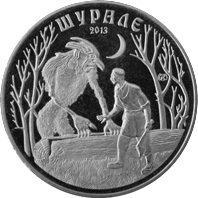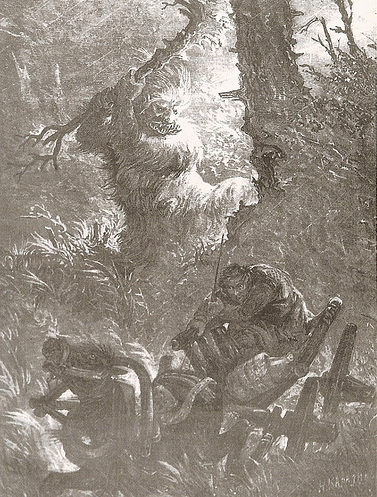|
Şüräle
Shurale ( Tatar and Bashkir: –®“Ø—Ä”ô–ª–µ, Éyr√¶Ààl…ò russian: –®—É—Ä–∞–ª–µ) is a forest spirit in Tatar and Bashkir mythology. According to legends, ≈û√ºr√§le lives in forests. He has long fingers, a horn on its forehead, and a woolly body. He lures victims to a thicket and can tickle them to death. ≈û√ºr√§le closely resembles other similar characters from the folklore such as Ar√ßuri of the Chuvash, Pitsen (Picen) of the Siberian Tatars and Yarƒ±mtƒ±q of the Ural Tatars. Description He can shapeshift into many different forms. As a human, he looks like a peasant with glowing eyes, and his shoes are on backwards. A person who befriends ≈û√ºr√§le can learn the secrets of magic. Farmers and shepherds would make pacts with the leshy to protect their crops and sheep. ≈û√ºr√§le has many tricks, including leading peasants astray, making them sick, or tickling them to death. They are also known to hide the axes of woodcutters. A person gets lost in the woods when a ≈û√ºr√§le c ... [...More Info...] [...Related Items...] OR: [Wikipedia] [Google] [Baidu] |
Pitsen
Pitsen is a forest creature in the Siberian Tatars' mythology. Pitsen's role is contradictory. It could bring luck, but also troubles, leading humans to the wilderness. Shapeshifting is common for Pitsen: he may look like an elder with a staff and knapsack, but also like different animals, for example apes. Pitsen prefers to live in derelict lodges. He also likes to ride horses and to oil their mane with tar. –í–∞–ª–µ–µ–≤ –§. –¢., –û —Ä–µ–ª–∏–≥–∏–æ–∑–Ω—ã—Ö –ø—Ä–µ–¥—Å—Ç–∞–≤–ª–µ–Ω–∏—è—Ö –∑–∞–ø–∞–¥–Ω–æ—Å–∏–±–∏—Ä—Å–∫–∏—Ö —Ç–∞—Ç–∞—Ä, –≤ —Å–±.: –ü—Ä–∏—Ä–æ–¥–∞ –∏ —á–µ–ª–æ–≤–µ–∫ –≤ —Ä–µ–ª–∏–≥–∏–æ–∑–Ω—ã—Ö –ø—Ä–µ–¥—Å—Ç–∞–≤–ª–µ–Ω–∏—è—Ö –Ω–∞—Ä–æ–¥–æ–≤ –°–∏–±–∏—Ä–∏ –∏ –°–µ–≤–µ—Ä–∞, –õ., 1976, —Å. 320-29. Pitsen, when transformed to a damsel, may have sexual intercourse or marry a human. One legend says that one hunter happened upon beautiful damsel in a forest and married her. Soon they become rich. Once he came home ahead of time and saw a tusky monster eating lizards. He cried, being horrifi ... [...More Info...] [...Related Items...] OR: [Wikipedia] [Google] [Baidu] |
Tatar Language
Tatar ( or ) is a Turkic languages, Turkic language spoken by Volga Tatars, Tatars mainly located in modern Tatarstan (European Russia), as well as Siberia. It should not be confused with Crimean Tatar language, Crimean Tatar or Siberian Tatar language, Siberian Tatar, which are closely related but belong to different subgroups of the Kipchak languages. Geographic distribution The Tatar language is spoken in Russia (about 5.3 million people), Ukraine, China, Finland, Turkey, Uzbekistan, the United States, United States of America, Romania, Azerbaijan, Israel, Kazakhstan, Georgia (country), Georgia, Lithuania, Latvia and other countries. There are more than 7 million speakers of Tatar in the world. Tatar is also native for several thousand Mari people, Maris. Mordva's Qaratay group also speak a variant of Kazan Tatar. In the Russian Census (2010), 2010 census, 69% of Russian Tatars who responded to the question about language ability claimed a knowledge of the Tatar language ... [...More Info...] [...Related Items...] OR: [Wikipedia] [Google] [Baidu] |
Bashkir Language
Bashkir (, ; Bashkir: ''Bashqortsa'', ''Bashqort tele'', ) is a Turkic language belonging to the Kipchak branch. It is co-official with Russian in Bashkortostan. It is spoken by approximately 1.4 million native speakers in Russia, as well as in Ukraine, Belarus, Kazakhstan, Uzbekistan, Estonia and other neighboring post-Soviet states, and among the Bashkir diaspora. It has three dialect groups: Southern, Eastern and Northwestern. Speakers Speakers of Bashkir mostly live in the republic of Bashkortostan (a republic within the Russian Federation). Many speakers also live in Tatarstan, Chelyabinsk, Orenburg, Tyumen, Sverdlovsk and Kurgan Oblasts and other regions of Russia. Minor Bashkir groups also live in Kazakhstan and other countries. Classification Bashkir together with Tatar belongs to the Bulgaric (russian: –∫—ã–ø—á–∞–∫—Å–∫–æ-–±—É–ª–≥–∞—Ä—Å–∫–∞—è) subgroups of the Kipchak languages. They share the same vocalism and the vowel shifts (see below) that make both languages ... [...More Info...] [...Related Items...] OR: [Wikipedia] [Google] [Baidu] |
Tatars
The Tatars ()Tatar in the Collins English Dictionary is an umbrella term for different Turkic ethnic groups bearing the name "Tatar". Initially, the ethnonym ''Tatar'' possibly referred to the . That confederation was eventually incorporated into the when unified the various steppe tr ... [...More Info...] [...Related Items...] OR: [Wikipedia] [Google] [Baidu] |
Bashkirs
, native_name_lang = bak , flag = File:Bashkirs of Baymak rayon.jpg , flag_caption = Bashkirs of Baymak in traditional dress , image = , caption = , population = approx. 2 million , popplace = 1,584,554 1,172,287 , region2 = , pop2 = 41,000 , ref2 = , region3 = , pop3 = 58,500 , ref3 = , region4 = , pop4 = 4,253 , ref4 = , region5 = , pop5 = 1,200 , ref5 = , region6 = , pop6 = 8,000 , ref6 = , region7 = , pop7 = 610 , ref7 = , region8 = , pop8 = 300 , ref8 = , region9 = , pop9 = 400 , ref9 = , region10 = , pop10 = 112 , ref10 = , region11 = , pop11 = 1,111 , ref11 ... [...More Info...] [...Related Items...] OR: [Wikipedia] [Google] [Baidu] |
Archura
Archura (Old Turkic: ê∞Äê∞∫ê∞≤ê∞Üê∞∫ê∞Ä) is a shapeshifting woodland spirit in Turkic mythology who protects wild animals and forests. Description Archura usually appears as a man, but he is able to change his size from that of a blade of grass to a very tall tree. He has hair and a beard made from living grass, and is sometimes depicted with a tail, hooves, and horns. Archura has a close bond with the gray wolf ( Turkish: Bozkurt). Legend describes him as having a red scarf and his left shoe on his right foot.T√ºrk Mitolojisi Ansiklopedik S√∂zl√ºk, Celal Beydili, Yurt Yayƒ±nevi (Page - 67) He also had no shadow. Archura protects the animals and birds in the forest and tells them when to migrate. He can shapeshift into many different forms. As a human, he looks like a peasant with glowing eyes. Archuras are terribly mischievous beings: they have horrible cries, and can imitate voices of people familiar to wanderers and lure them back to their caves, where the Archuras will ti ... [...More Info...] [...Related Items...] OR: [Wikipedia] [Google] [Baidu] |
Chuvash People
The Chuvash people ( , ; cv, чӑваш ; russian: чуваши ) are a Turkic ethnic group, a branch of Oghurs, native to an area stretching from the Volga-Ural region to Siberia. Most of them live in Chuvashia and the surrounding areas, although Chuvash communities may be found throughout the Russian Federation. They speak Chuvash, a unique Turkic language that diverged from other languages in the family more than a millennium ago. Etymology There is no universally accepted etymology of the word ''Chuvash'', but there are three main theories. The popular theory accepted by Chuvash people suggests that ''Chuvash'' is a Shaz-Turkic adaptation of Lir-Turkic ''Suvar'' (Sabir people), an ethnonym of people that are widely considered to be the ancestors of modern Chuvash people. Compare Lir-Turkic Chuvash: ''huran'' to Shaz-Turkic Tatar: ''qazan'' (‘cauldron’). One theory suggests that the word ''Chuvash'' may be derived from Common Turkic ''jăvaš'' ('friendly', 'pea ... [...More Info...] [...Related Items...] OR: [Wikipedia] [Google] [Baidu] |
Siberian Tatars
Siberian Tatars ( sty, , ), the ethnographic and ethnoterritorial group of Tatars of Western Siberia, the indigenous Turkic-speaking population of the forests and steppes of Western Siberia, originate in areas stretching from somewhat east of the Ural Mountains to the Yenisey River in Russia. The Siberian Tatars call themselves ''Yerle Qalıq'' ("older inhabitants"), to distinguish themselves from more recent Volga Tatar immigrants to the region. The word "Tatar" or "Tadar" is also used as a self-designation by some closely related Siberian ethnic groups, namely the Chulym, Khakas, Shor, Teleut, Bashkirs and Kazakhs people. The 2010 census counted more than 500,000 people in Siberia defining their ethnicity as "Tatar". About 200,000 of them are considered indigenous Siberian Tatars. However, only 6,779 of them called themselves "Siberian Tatars". It is not completely clear which part of those who called themselves "Siberian Tatars" consider themselves to be a separate ... [...More Info...] [...Related Items...] OR: [Wikipedia] [Google] [Baidu] |
Leshy
The Leshy (also Leshi; rus, –ª–µ—à–∏–π, p=Ààl ≤e Ç…®j; literally, " efrom the forest", pl, borowy, le≈õnik, le≈õniczy, lasowik, leszy) is a tutelary deity of the forests in pagan Slavic mythology. As the spirit rules over the forest and hunting, he may be related to the Slavic god Porewit. There is also a deity, named ''Svyatibor'' (''Svyatobor'', ''Svyatibog''), who is mentioned in the beliefs of the Eastern and Western Slavs as the god of forests and the lord of the leshies. His functions were identical to those of the god Veles. The Leshy is masculine and humanoid in shape, is able to assume any likeness and can change in size and height. In some accounts, Leshy is described as having a wife (''Leshachikha'', ''Leszachka'', ''Lesovikha'' and also, sometimes, the '' Kikimora'' of the swamp) and children (''leshonki'', ''leszonky''). He is known by some to have a propensity to lead travelers astray and abduct children (which he shares with Chort, the "Black One"), which wou ... [...More Info...] [...Related Items...] OR: [Wikipedia] [Google] [Baidu] |
Ghabdulla Tuqay
Abd Allah ( ar, ÿπÿ®ÿØÿߟџџá, translit= ªAbd AllƒÅh), also spelled Abdallah, Abdellah, Abdollah, Abdullah and many others, is an Arabic name meaning "Servant of God". It is built from the Arabic words '' abd'' () and ''AllƒÅh'' (). Although the first letter "a" in ''AllƒÅh'', as the first letter of the article ''al-'', is usually unstressed in Arabic, it is usually stressed in the pronunciation of this name. The variants ''Abdollah'' and ''Abdullah'' represent the elision of this "a" following the "u" of the literary Arabic nominative case (pronounced in Persian). Abd Allah is one of many Arabic theophoric names, meaning ''servant of God''. ''God's Follower'' is also a meaning of this name. Humility before God is an essential value of Islam, hence ''Abdullah'' is a common name among Muslims. However, the name of the Islamic prophet Muhammad's father was Abdullah. The prophet's father died before his birth, which indicates that the name was already in use in pre-Islamic Arabia. ... [...More Info...] [...Related Items...] OR: [Wikipedia] [Google] [Baidu] |
Pseudonym
A pseudonym (; ) or alias () is a fictitious name that a person or group assumes for a particular purpose, which differs from their original or true name (orthonym). This also differs from a new name that entirely or legally replaces an individual's own. Many pseudonym holders use pseudonyms because they wish to remain anonymous, but anonymity is difficult to achieve and often fraught with legal issues. Scope Pseudonyms include stage names, user names, ring names, pen names, aliases, superhero or villain identities and code names, gamer identifications, and regnal names of emperors, popes, and other monarchs. In some cases, it may also include nicknames. Historically, they have sometimes taken the form of anagrams, Graecisms, and Latinisations. Pseudonyms should not be confused with new names that replace old ones and become the individual's full-time name. Pseudonyms are "part-time" names, used only in certain contexts – to provide a more clear-cut separation between o ... [...More Info...] [...Related Items...] OR: [Wikipedia] [Google] [Baidu] |




.png)

